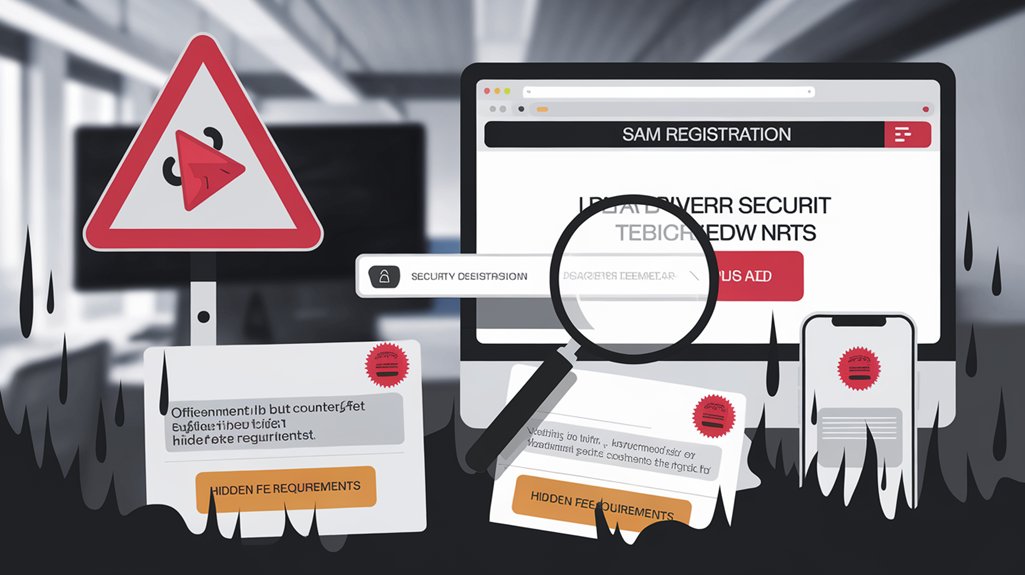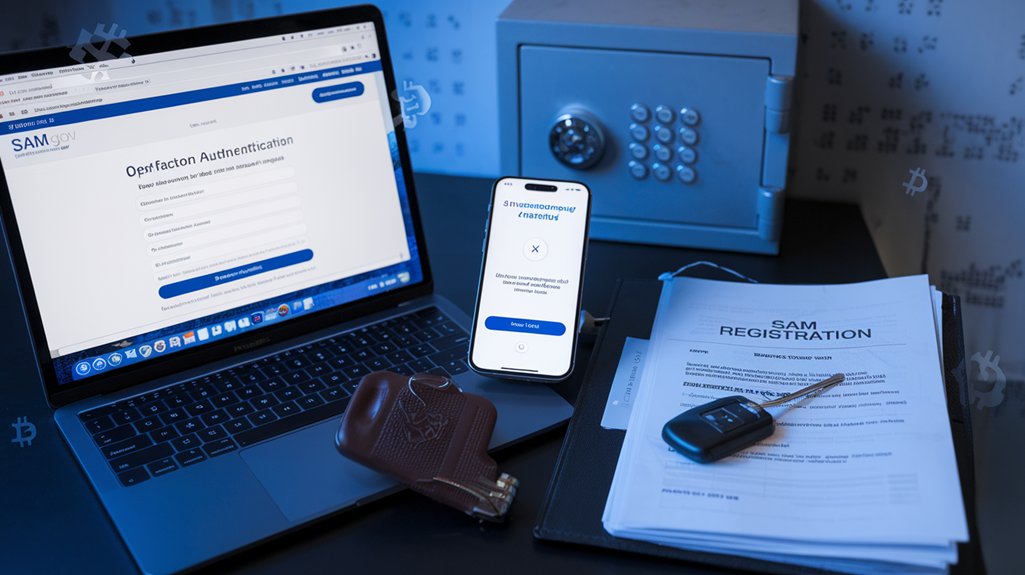Businesses can avoid SAM registration scams by watching for red flags like unsolicited emails, payment requests, and high-pressure tactics. Legitimate SAM communications never require payment for standard services and typically arrive through the SAM.gov portal. Organizations should enable two-factor authentication, verify communications through official government domains (.gov), and train employees to recognize suspicious contacts. Implementing these protective measures creates a strong defense against increasingly sophisticated government registration fraud schemes.
Red Flags That Signal a SAM Registration Scam

When maneuvering through the System for Award Management (SAM) registration process, businesses must remain vigilant against numerous scam attempts targeting this essential government requirement.
Recognizing scam indicators can protect organizations from costly and damaging fraud.
Watch for unsolicited emails claiming expired registrations, websites resembling SAM.gov that request sensitive information, and communications containing typos or missing official disclaimers. These common phishing tactics often create artificial urgency to prompt hasty decisions.
Be wary of cold calls offering expedited services for fees, promises to fast-track registrations, or guarantees of government contracts. Legitimate SAM registration never requires payment. Third-party companies often make false government affiliations to deceive potential clients.
Additionally, scrutinize websites lacking HTTPS security features and those requesting financial information. Remember that scammers often exploit public information to make their communications appear more legitimate and trustworthy.
Time-pressure tactics, including threats of debarment or penalties for non-compliance, almost always signal fraudulent activity. Legitimate communications will only come through official .gov domains, not from commercial email addresses that scammers typically use.
How Legitimate SAM Communications Actually Work

Understanding legitimate SAM communications provides the best defense against scams targeting government contractors.
Official SAM.gov communications never request payment for standard registration services and typically arrive through the SAM.gov portal or other established government channels. During the SAM verification process, all messages maintain a professional, non-urgent tone focused on providing information rather than selling services. DUNS number verification is required before registration can be completed.
Legitimate SAM communications are professional, payment-free, and delivered through official government channels.
Authorized representative responsibilities include:
- Managing all updates to the entity’s SAM profile through the official SAM.gov website
- Ensuring business information remains accurate and current
- Verifying the legitimacy of communications by checking sender credentials
Communications from legitimate sources will direct users to SAM.gov for any actions needed, rather than third-party websites. Legitimate registration occurs only through the official www.sam.gov website, never through third-party platforms.
Representatives should access the system only through login.gov and maintain records of all government interactions to prevent unauthorized changes. Implementing two multifactor authentication methods for Login.gov accounts provides an additional layer of security against unauthorized access attempts.
Practical Steps to Protect Your Business From SAM Fraud

Several effective strategies exist for businesses to shield themselves from increasingly sophisticated SAM registration scams. Companies should implement robust business security protocols, including enabling two-factor authentication for all SAM.gov accounts and limiting access to registration credentials to essential personnel only.
Developing scam awareness throughout the organization is vital. Businesses should:
- Verify all communications through official government domains (.gov)
- Never respond to payment requests for SAM services
- Document all registration steps with confirmation numbers
- Conduct regular audits of SAM account information
Training employees to recognize suspicious contact attempts can prevent costly mistakes.
Companies should store SAM registration documents securely and maintain a contact list of legitimate government representatives for verification purposes when questions arise.
Federal grant eligibility requires maintaining an active SAM registration status to receive government funding.
Frequently Asked Questions
Can I Recover Money Paid to SAM Registration Scammers?
Recovering money paid to SAM registration scammers is extremely difficult, but not impossible.
Legal recourse options include filing police reports and contacting financial institutions to dispute charges.
Scam recovery strategies may involve working with credit card companies to initiate chargebacks or consulting with consumer protection attorneys.
Unfortunately, most funds sent to scammers, especially those transferred through wire services or cryptocurrency, have very low recovery rates.
Are There Penalties for Scammers Who Target SAM Registrants?
Scammers targeting SAM registrants face substantial legal consequences. The penalties include potential civil and criminal charges, fines, and imprisonment depending on the nature of the fraud.
The GSA actively monitors for fraudulent activity, with scam penalties increasing in severity based on the extent of the deception. Federal agencies collaborate to prosecute these cases under fraud statutes.
Unauthorized access to SAM systems can result in additional charges under computer fraud legislation.
How Quickly Can I Get Emergency SAM Registration Help?
For emergency assistance with SAM registration, entities should contact the Federal Service Desk (FSD).
While there are no formal expedited processes, the FSD provides technical support through live chat and help desk tickets for quick registration issues.
Having all required documents ready, including EIN and UEI, can greatly reduce registration time.
Remember that standard processing typically takes 2-3 business days, and there are no legitimate paid services to accelerate this timeline.
Who Should I Report SAM Scam Attempts To?
Organizations should report SAM scam attempts to three key reporting agencies for effective scam prevention:
- FBI Internet Crime Complaint Center (IC3) with complete documentation
- Local law enforcement with evidence of the attempted fraud
- Official SAM.gov channels through their designated reporting system
These reports help authorities track emerging threats, protect other organizations, and maintain system-wide security.
Keeping detailed records of all suspicious communications supports both reporting efforts and potential future investigations.
Do SAM Scammers Typically Target Specific Industries?
SAM scammers don’t typically target specific industries; rather, they focus on any business registered on SAM.gov.
Recent registration activity, not industry type, is the primary vulnerability factor. Scam awareness should be consistent across all sectors involved in government contracting, as all face similar risks.
Companies in manufacturing, construction, IT services, and healthcare have all reported scam attempts, demonstrating that scammers prioritize opportunity over industry specifics when selecting potential victims.